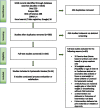Process evaluations of early childhood obesity prevention interventions delivered via telephone or text messages: a systematic review
- PMID: 33422066
- PMCID: PMC7796572
- DOI: 10.1186/s12966-020-01074-8
Process evaluations of early childhood obesity prevention interventions delivered via telephone or text messages: a systematic review
Abstract
Background: Increasingly, public health interventions are delivered via telephone and/or text messages. Recent systematic reviews of early childhood obesity prevention interventions have not adequately reported on the way interventions are delivered and the experiences/perceptions of stakeholders. We aimed to summarise the literature in early childhood obesity prevention interventions delivered via telephone or text messages for evidence of application of process evaluation primarily to evaluate stakeholders' acceptability of interventions.
Methods: A systematic search of major electronic databases was carried out using the Population, Intervention, Comparison, Outcomes framework. Studies were included if interventions were delivered via telephone/text messages; aimed at changing caregivers' behaviours to prevent early childhood obesity; with one or more outcomes related to early obesity risk factors such as breastfeeding, solid feeding, tummy time, sleep and settling, physical activity and screen time; published from inception to May 2020. All eligible studies were independently assessed by two reviewers using the Cochrane Collaboration tool for assessing risk of bias. Qualitative studies were assessed using the Consolidated Criteria for Reporting Qualitative Research and Standards for Reporting Qualitative Research tools.
Results: Twenty-four studies were eligible, and the overall risk of bias was low. Eight studies (33%) had evidence of process evaluation that examined participants' perceptions of interventions. Participants appreciated the convenience of receiving interventions via telephone or text messages. 63% of all studies in this review showed improvement in one or more behaviours related to childhood obesity prevention. Participants were likely to modify behaviours if they received information from a credible source such as from health professionals.
Conclusion: There is limited reporting of stakeholders' experiences in early obesity prevention studies delivered by telephone or text messages. Only one-third of studies examined participants' acceptability and the potential for delivery of childhood obesity prevention interventions conveniently using this mode of delivery. Interventions delivered remotely via telephone or text messages have the potential to reach equal or a greater number of participants than those delivered via face-to-face methods. Future research should build in process evaluation alongside effectiveness measurements to provide important insight into intervention reach, acceptability and to inform scale up.
Trial registration: PROSPERO registration: CRD42019108658.
Keywords: Antenatal/postnatal women; Apps; Caregivers; Childhood obesity prevention; Early childhood; Process evaluation; SMS; Systematic review; Telephone; Text messages.
Conflict of interest statement
The authors declare that they have no competing interests.
Figures
References
-
- Wen LM, Baur LA, Rissel C, Wardle K, Alperstein G, Simpson JM. Early intervention of multiple home visits to prevent childhood obesity in a disadvantaged population: a home-based randomised controlled trial (Healthy Beginnings Trial). BMC Public Health. 2007;7 PubMed PMID: WOS:000247035500001. - PMC - PubMed
-
- Daniels LA, Magarey A, Battistutta D, Nicholson JM, Farrell A, Davidson G, et al. The NOURISH randomised control trial: Positive feeding practices and food preferences in early childhood - A primary prevention program for childhood obesity. BMC Public Health. 2009;9(1):387. doi: 10.1186/1471-2458-9-387. - DOI - PMC - PubMed
Publication types
MeSH terms
LinkOut - more resources
Full Text Sources
Other Literature Sources
Medical



